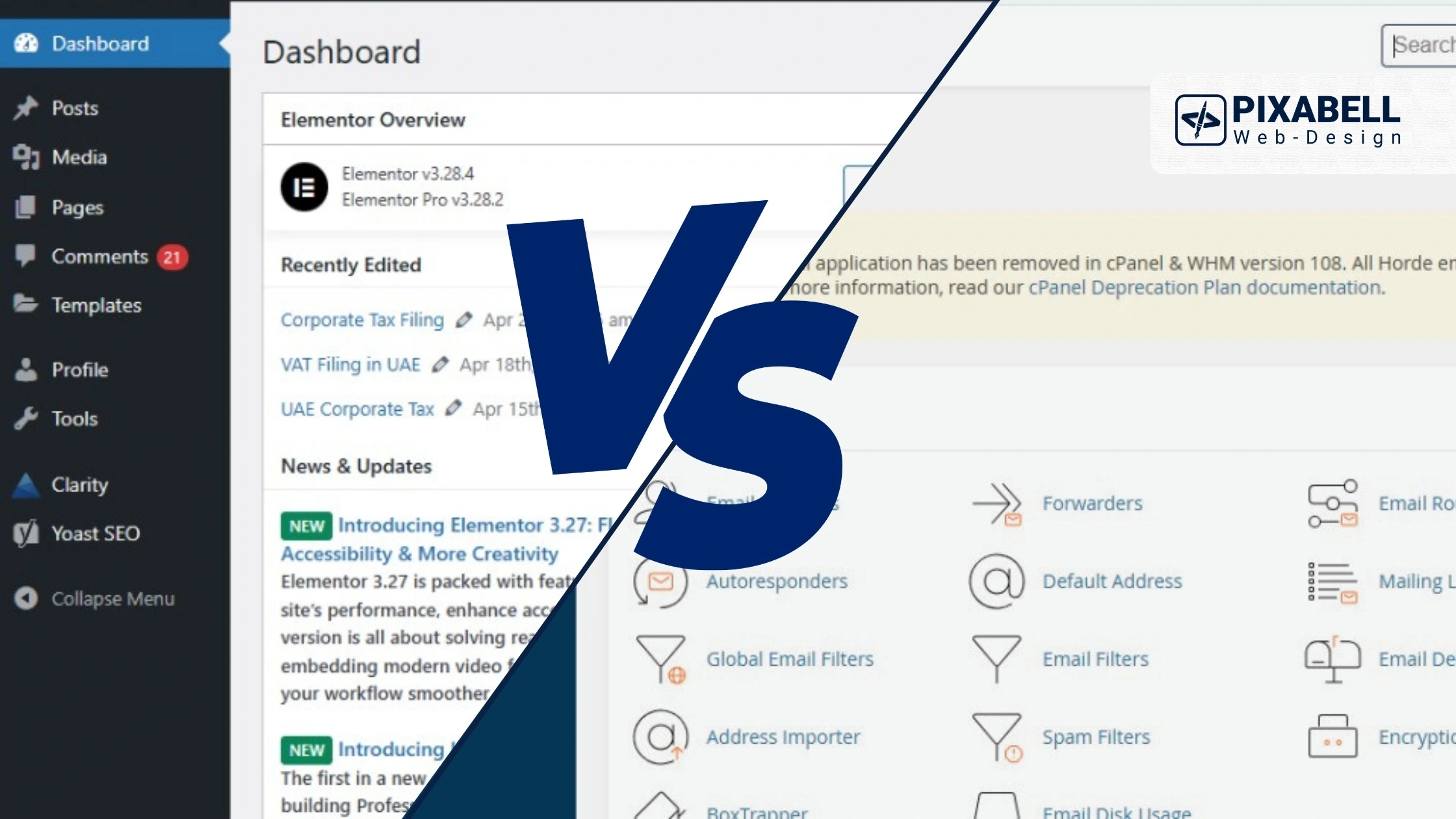You need to act immediately if your Dubai business website is hacked, because it’s an instant threat to your business reputation. Around 30,000 websites get compromised every day. That’s why we’ve developed a framework that makes our clients’ websites resilient to malware attacks. Because, for the best website development company in Dubai, prevention is better than cure.
Table of Contents
ToggleKey Highlights
- Most common attacks include SEO spam, backdoors, SQL injection and XSS vulnerabilities.
- First steps include going offline, changing passwords and scanning for malware.
- Update regularly, use WAF, and secure file permissions.
- Regular monitoring helps maintain website security.
My website is hacked! What to do?
Okay, so if your website is acting strange, here’s everything that you need to do immediately:
Take your website offline
Put your website into maintenance mode at once. Inform your hosting provider, like GoDaddy, as they may have immediate protocols to isolate the issue at the server level.
Change the following passwords
- Your hosting account password.
- FTP/SFTP and SSH credentials.
- All CMS admin accounts (like WordPress)
- Your database passwords.
- cPanel/Plesk or other control panel passwords.
Types of website malware attacks (and exactly how to fix them)
Malware comes in many forms. And each has a specific fix. Here is what you should do for each attack:
SEO Spam or Japanese Keyword Hack
Attackers inject spammy keywords or pages (e.g., Japanese text, pharma ads) to hijack your search rankings.
- How to spot it:
- Unwanted pages in Google search (site:yourdomain.com spam_keyword).
- Google Search Console (GSC) hacked content alerts.
- Strange text in your site’s search snippets.
- Unauthorized changes to .htaccess, sitemap, or wp-config.php.
- How to fix it:
- Remove unauthorized users in GSC/CMS.
- Scan with malware tools.
- Inspect & clean/replace .htaccess, wp-config.php, core CMS files.
- Check recently modified files for unfamiliar code.
- Delete all injected spam pages/links from the content & database.
- Clean & resubmit your sitemap to Google.
- Use Google’s URL Removal tool for spammy indexed pages.
- How to prevent it next time:
- Limit user permissions.
- Keep CMS, themes, plugins updated.
- Install a Web Application Firewall (WAF).
- Run regular malware scans.
- Set correct file permissions (644 files, 755 directories).
Find and remove hidden backdoor attacks on your business website
Backdoors are hidden entries hackers use to regain access after cleanup. They are disguised in code or as harmless files.
- How to spot them:
- Look for unfamiliar PHP files.
- Suspicious functions in code (eval, base64_decode, exec).
- Recently modified files with odd names.
- Often found by professional scanners or deep file audits.
- How to fix them:
- Scan all files & database thoroughly.
- Identify & remove suspicious files/code (compare with clean originals).
- Change ALL passwords, API keys, and security salts.
- How to prevent them next time:
- Strict access controls & user permissions.
- Remove unused plugins/themes.
- Update everything (core, themes, plugins).
- Use a WAF.
- Conduct regular code reviews & file integrity monitoring.
SQL Injection attack and how to fix it?
Hackers insert malicious SQL code via input fields (forms, URLs) to control or steal data from your database.
- How to Spot It:
- Unusual database activity or modified content.
- Strange website error messages exposing database info.
- GSC warnings; web vulnerability scanners can detect flaws.
- How to fix It:
- Identify vulnerabilities in input points on your site.
- Clean malicious entries from your database (restore clean backup if possible).
- Patch vulnerable code using parameterized queries (prepared statements) & input validation.
- How to prevent SQL injection attack in future:
- Validate & sanitize ALL user input.
- Keep database user permissions minimal.
- Regularly update server & database software.
- Implement a Web Application Firewall (WAF).
Cross-Site Scripting (XSS) vulnerabilities on website
Attackers inject malicious scripts (e.g., JavaScript) into your pages, which then run in visitors’ browsers to steal data or redirect them.
- How to find XSS attacks:
- Users report strange pop-ups, ads, or redirects on your site.
- GSC may warn about XSS issues.
- Vulnerability scanners can find XSS flaws.
- How to fix It:
- Find where unsanitized input is displayed on your site.
- Implement proper output encoding/escaping for all user-supplied data.
- Clean affected database entries or files serving the malicious script.
- How to prevent future XSS attacks:
- Sanitize all user input server-side.
- Use context-sensitive output encoding.
- Implement a Content Security Policy (CSP).
- Set HttpOnly flag for cookies.
- Use a WAF.
How to restore and secure a defaced website?
Hackers change your website’s appearance, replacing it with their own messages or images.
- How to fix a defaced website:
- Identify how they got access (check logs for compromised accounts/vulnerabilities).
- Restore affected files/pages from a known clean backup.
- If no clean backup, manually remove malicious files/code & revert changes.
- Address the root vulnerability that allowed access.
- How to prevent it next time:
- Use strong, unique passwords.
- Regularly update CMS, themes, plugins.
- Use a WAF.
- Secure file permissions.
- Limit admin access.
- Monitor file integrity.
Drive-By Download attacks and how to stop them?
Malware automatically downloads to a visitor’s computer when they visit your compromised webpage.
- How to spot it:
- Users’ antivirus flags your site.
- GSC notifications about malicious downloads.
- Often involves injected malicious scripts or iframes.
- How to fix it:
- Scan site to find & remove malicious scripts causing downloads.
- Check & secure or remove compromised third-party elements (ads, widgets).
- How to prevent it next time:
- Keep all website software (CMS, plugins, themes) updated.
- Use a WAF.
- Regularly scan for vulnerabilities.
- Secure third-party integrations carefully.
Website redirecting to spammy or malicious sites
Users may report being redirected or analytics show traffic to unknown sites.
- How to fix It:
- Inspect .htaccess for suspicious redirect rules.
- Scan JavaScript files & database for redirect scripts.
- Remove the malicious redirect code once found.
- How to prevent it next time:
- Regularly scan files & database.
- Install a WAF.
- Keep all software updated.
- Ensure secure file permissions.
Hire a web developer in Dubai to secure your website
Our clients call us the best website development company in Dubai because apart from the well-designed and optimized website, they wouldn’t have to worry about any malware attacks either. Our comprehensive website maintenance means that your website will be secure from future attacks.
FAQs
How to tell if my website is hacked?
Sudden drop in traffic, unexpected redirects, or unfamiliar content.
Will my website’s SEO rankings be affected by malware attack?
Yes, search engines may penalize or blacklist infected sites.
Is it necessary to inform my users about the hack?
Yes, transparency builds trust. Inform them if their data was compromised.




